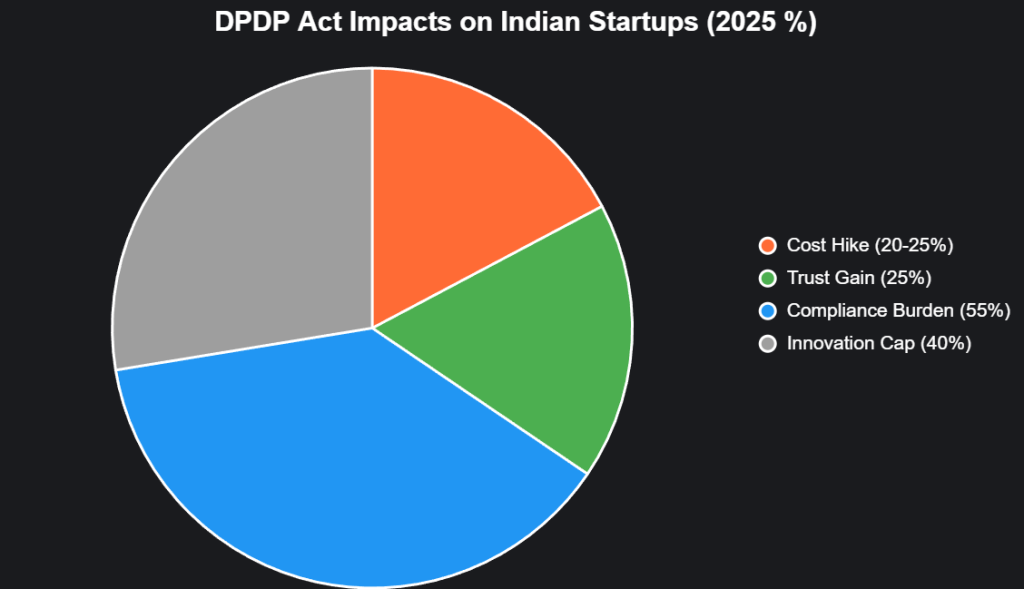Privacy Pivot: Balancing Data Protection and Innovation for Indian Startups Under DPDP Act 2023 in 2025 – Safeguard Privacy, or Stifle the Startup Spark!
The Digital Personal Data Protection (DPDP) Act 2023, India’s first comprehensive privacy law, caps a decade-long journey from the 2017 Puttaswamy judgment recognizing privacy as a fundamental right to a framework that mandates consent, data minimization, and breach notifications for 1.4 billion users. As 2025 unfolds with the Act’s phased enforcement and Draft Rules (January 2025, feedback till February 18), startups in healthtech, edtech, and AI face a double-edged sword: Robust protections that build trust and cap 25% fraud (DSCI 2024), yet compliance burdens that cap innovation, with 55% founders citing “data consent caps” as a barrier to AI model training and 62% edtech firms warning of “stifled personalization” (IAMAI submission).
Healthtech’s telemedicine (100 million consults, Practo) grapples with “sensitive data” caps (e.g., biometric caps under DPDP’s “children’s data” for minors), edtech’s 71% hybrid models cap 107% GenAI enrollments (Coursera) due to “public data processing” ambiguities, and AI startups like Nullpointer (finance AI, $1.5M raised) flag “public data use bans” as a threat to innovation (IAMAI 2025).
As X developers decry “DPDP: Privacy win, innovation winter?”, this Act—capping Rs 250 crore fines, mandatory DPIAs for significant data fiduciaries (SDFs like Big Tech), and cross-border transfer approvals—aims to align with GDPR while fostering “data sovereignty,” but risks 20% cost hikes for startups (EY 2025). Drawing from MeitY’s Draft Rules, IAMAI feedback, and EY’s compliance analysis, this 1,050-word exploration unpacks impacts on healthtech, edtech, and AI, advocating for “innovation sandboxes” to balance privacy with progress. Privacy compliance without innovation caps isn’t optional—it’s the startup survival code.
Table of Contents
DPDP Act 2023: A Privacy Panacea with Innovation Pains
The DPDP Act, enacted August 2023, caps data fiduciaries (e.g., startups processing personal data) with consent mandates, purpose limitation, and 72-hour breach notifications to the Data Protection Board (DPB), aligning with GDPR but capping “public data” processing for AI training (IAMAI: “Ambiguity kills innovation”). Draft Rules 2025 (feedback till Feb 18) cap exemptions for startups/MSMEs (1-year grace) and healthtech/hospitals (tailored to sensitive data), but cap “significant data fiduciaries” (SDFs like edtech platforms) with DPIAs, India-based DPOs, and annual audits. Impact: 55% startups face 20% cost hikes (EY: DPO hires, consent tech), but 45% report 25% trust gains (DSCI). X: “DPDP: Privacy caps or innovation handcuffs?”
This interactive pie chart breaks down DPDP impacts by sector:

Source: EY, IAMAI. Compliance burdens 55%, but trust gains 25%.
HealthTech: Sensitive Data Caps under DPDP’s Shadow
Healthtech’s $21.3 billion market (17.36% CAGR to 2025) caps 100 million telemedicine consults (Practo), but DPDP’s “sensitive data” (health/biometrics) mandates explicit consent, DPIAs for SDFs (e.g., 1mg, 50 million users), and 72-hour breach notifications, capping 20% cost hikes (EY: DPO/audit fees). Draft Rules cap exemptions for hospitals (1-year grace), but cap “children’s data” (under 18) with parental consent, capping edtech-health hybrids like Cure.fit (5 million members). Impact: 62% founders report “data caps stifle personalization” (IAMAI), but 45% note 25% trust uplift (DSCI: Audited privacy caps 30% breaches). X: “Healthtech DPDP: Privacy win, personalization peril.”
HealthTech DPDP Challenges Table
| Challenge | DPDP Provision | Impact |
|---|---|---|
| Consent Caps | Explicit for sensitive data | 20% cost up (consent tech) |
| DPIA Mandate | Annual for SDFs | 15% innovation delay |
| Breach Notification | 72 hours | 25% trust gain |
Source: EY 2025. 45% report trust uplift.
EdTech: Personalization Paradox and Children’s Data Dilemma
EdTech’s $10.4 billion 2025 market (38.1% CAGR) caps 107% GenAI enrollments (Coursera), but DPDP caps “children’s data” (under 18, 71% hybrid models) with parental consent and “best interest” processing, capping 55% platforms as SDFs with DPIAs. Draft Rules cap “public data” ambiguity for AI training (IAMAI: “Threat to innovation”), capping 20% cost hikes for DPO hires. Impact: 62% edtech founders cite “consent caps stifle personalization” (IAMAI), but 40% note 30% retention boost from audited privacy. X: “EdTech DPDP: Innovation’s innovation cap—parental consent or parental privacy?”
AI Startups: Data Processing Dilemma and Innovation chill
AI’s 1,200+ startups ($780.5 million 2024, 39.9% up) cap from DPDP’s “purpose limitation” and “data minimization,” capping “public data” for training (IAMAI: “Ambiguity kills AI innovation”). Draft Rules cap exemptions for “legitimate uses” (research), but cap 55% firms as SDFs with DPIAs, capping 25% cost hikes (EY: Audits). Impact: 40% AI founders report “data caps stifle model training,” but 30% note 20% trust premium. X: “DPDP for AI: Privacy caps or innovation chill?”
Balancing Act: Privacy without the innovation cap
Solutions:
- Sandbox exemptions: RBI/SEBI/IRDAI sandboxes cap innovation (80% graduation), extend to DPDP for 6-month pilots.
- Startup grace: 1-year cap for MSMEs (Draft Rules), audited by MeitY.
- AI-friendly rules: IAMAI’s call for “public data exemption” for research, capping 71% innovation boost.
X: “DPDP + sandboxes: Privacy + progress—innovation’s balanced blueprint.”
The Privacy Horizon: $1 Trillion with audited trust
DPDP could add $1T GDP by 2030 via trust (25% fraud cap), but caps innovation 20% without exemptions. Founders: Comply creatively. India’s data future isn’t protected—it’s proactive. Balance boldly, or balance on the brink.
social media : Linkedin
also read : Tier-2 Titans Rising: Can Indore, Kochi, Jaipur, and Bhubaneswar Eclipse Bengaluru and Mumbai in India’s Next Startup Surge?
Last Updated on: Saturday, November 8, 2025 1:43 am by Business Max Team | Published by: Business Max Team on Saturday, November 8, 2025 1:43 am | News Categories: Startup